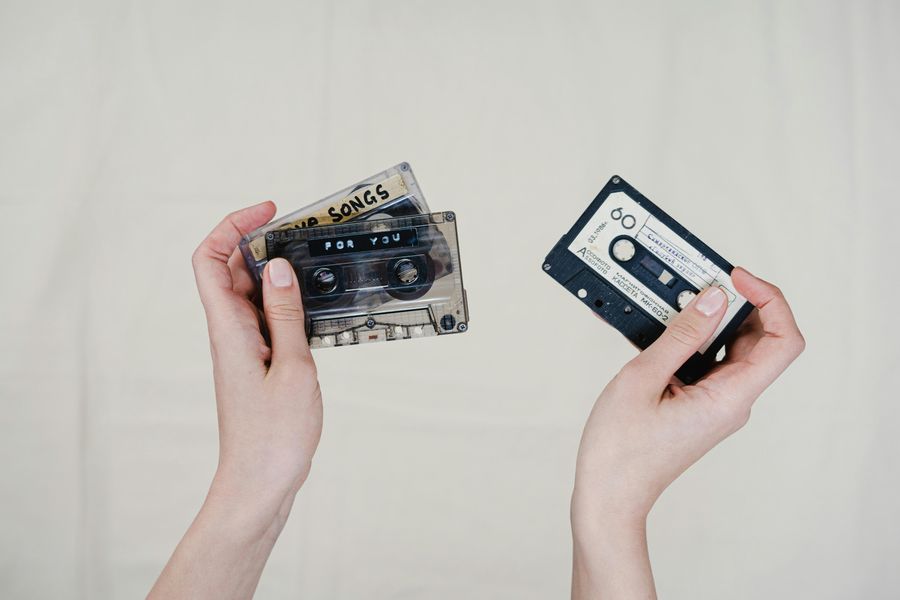Identifying Fake Friends
Have you ever had a friend who drained your energy and left you feeling worse than before you spent time together? If you have, then you’ve likely experienced a toxic friendship.
Toxic friendships can be tough to navigate, as it can be hard to recognize when someone is treating you poorly. Here are some signs to look out for when it comes to identifying fake friends.
Bad Behavior
One of the most obvious signs of fake friends is their behavior towards you. If they consistently put you down, criticize you, or belittle you, that’s a clear red flag.
Genuine friends want you to succeed and be happy, and they’ll support and encourage you to reach your goals. Fake friends, on the other hand, will often try to hold you back out of jealousy or insecurity.
Loyal Friends
Real friends are loyal no matter what. They stick by your side through thick and thin, and they’ll defend you when someone else is talking behind your back.
Fake friends may switch teams based on what’s most convenient for them, and they won’t be there for you when you need them most.
Draining Energy
Toxic friendships can be incredibly draining. Fake friends may constantly ask for help without reciprocating, leaving you feeling used and taken advantage of.
They might also always want to be the center of attention, leaving you feeling unheard and unimportant.
Genuine Bond
Real friendships are built on a foundation of mutual respect, trust, and love. Fake friendships are shallow and often based on superficial things like popularity or social status.
Fake friends may only want to hang out with you if you can provide something for them, like a connection to someone else they want to know.
Tough Love
Sometimes, real friends need to give tough love. They’ll tell you when you’re acting out of line and help you course correct.
Fake friends, on the other hand, will encourage bad behavior and let you make mistakes without trying to help you avoid them.
Unending Love
Real friendships are meant to last. Even if you don’t speak for months or even years, you know that when you reconnect, you’ll pick right back up where you left off.
Fake friends, on the other hand, may ghost you the second things become inconvenient for them. Toxic vs.
Bad Friendships
It’s important to note that there’s a difference between a toxic friendship and a bad one. A bad friendship may have started off well, but over time, things between you have devolved.
Perhaps they’ve betrayed your trust in a significant way, or you’ve simply grown apart. In cases like this, it’s necessary to have a conversation with your friend about what’s going on and be clear about your boundaries.
Toxic friendships, on the other hand, are consistently destructive. If your friend is consistently putting you down, manipulating you, or making you feel bad about yourself, it’s time to cut ties.
While it’s tempting to hope that things will get better, repeatedly giving chances to someone who’s treating you badly isn’t healthy for either of you.
Distinguishing Between Toxic and Bad Friends
It can be challenging to figure out whether a friendship is toxic or simply not working anymore. One way to tell is by looking at the behavior in question.
Is what they’re doing out of character for them? Are they lashing out because of a difficult situation they’re going through, or is this a consistent pattern of behavior from them?
Another thing to consider is whether they’re willing to admit to their behavior and make changes. Bad friends may be willing to listen to you when you call them out and try to improve their behavior.
Toxic friends, on the other hand, will often double down on their bad behavior and refuse to see the harm they’re causing.
Fake Friends and Long-Term Friendships
It can be especially challenging when it comes to fake friends who you’ve known for a long time. You may feel like you owe them something because you’ve been friends for so long, but that’s simply not true.
Weeding out bad people from your life, no matter how long you’ve known them, is essential for your personal happiness. If you’re struggling with cutting ties with a long-term friend who’s toxic, remember that it’s okay to take things slow.
You don’t have to ghost them immediately; instead, start by distancing yourself gradually. Spend less time with them, and when you do see them, make sure to set boundaries and be firm about enforcing them.
Importance of True Friends
While it’s important to acknowledge the warning signs of fake friends, it’s equally important to celebrate the joy and importance of true friendships. Here are some things to keep in mind when it comes to the power of genuine connections.
Genuine vs. Fake Bond
There’s nothing more valuable than a genuine connection with another person.
When you have a real bond with someone, you can count on them to support you, challenge you, and be there for you when you need them most. Fake connections, on the other hand, will only cause you stress and anxiety in the long run.
Support
True friends support each other through thick and thin. Whether you’re going through a difficult breakup, navigating a tough job situation, or simply feeling down, a real friend will be there to remind you that you’re not alone.
Kindness
Genuine connections are built on a foundation of kindness. Real friends won’t put you down or make you feel stupid for doing something that makes you happy.
Instead, they’ll share in your joy and encourage you to keep pursuing your passions. Mutual vs.
Secret Frenemy
A real friend is someone you can trust with your deepest secrets and vulnerabilities. They won’t use that information against you or gossip behind your back.
If you’re unsure whether or not someone is a true friend, think about whether or not you’d trust them with something important. If the answer is no, it’s time to reevaluate your connection.
Weeding Out Bad People
Life is too short to spend time with people who don’t contribute positively to your life. Weeding out bad people can be tough, but it’s essential for your overall happiness and well-being.
Admitting to Oneself
Admitting that someone in your life is a toxic or bad friend can be incredibly difficult. You may feel ashamed for letting things get this far, or you may worry that you’ll be lonely without them.
Remember that it’s okay to be alone for a while as you work on building better connections.
Personal Happiness
At the end of the day, genuine connections are one of the keys to personal happiness. Having people in your life who love and support you is essential for your well-being.
Don’t settle for fake friends who drain your energy and make you feel worse about yourself than you did before. Focus on building real bonds with people who make your life more enjoyable and fulfilling.
Signs of Fake Friends
We all need people we can lean on at some point in our life. Friends are essential to a happy and fulfilling life.
However, not all friendships are created equal, and some friendships can be toxic. To distinguish genuine friendships from fake ones, here are some signs to look out for.
Interruption and One-Sided Conversations
Fake friends often have an unquenchable thirst for attention. They always make the conversation about themselves, interrupting you when you try to share something about yourself or your life.
They listen only to reply, and they don’t genuinely care about what you have to say. Instead of engaging in meaningful conversations, they talk only to fill the silence with their words.
Hanging Out with Toxic People
The company we keep says a lot about us. Fake friends often hang out with negative and toxic people who don’t add any value to their lives.
They may have questionable morals, and they engage in bad habits such as drug use, gambling, or criminal activity. Hanging out with bad company can be detrimental to your image and reputation, and it often leads to guilt by association.
No Apologies
When things go wrong between genuine friends, they often apologize and try to fix the problem. In contrast, fake friends don’t apologize, and they even make you feel bad for wanting an apology.
They might manipulate situations to make you feel crazy and doubt yourself. This type of behavior is a clear sign of their bad intentions and suggests that it’s time to distance yourself from them.
Lack of
Support and Understanding
Fake friends will pretend to care when you share something with them, but they won’t really empathize with you. They’ll judge your decisions, and they’ll never be there when it matters.
This pattern of behavior suggests that they have bad intentions, and they may be pretending to care just to keep up the faade of a friendship.
Behaviors of Fake Friends
Sometimes, the signs of a fake friend are not always apparent. It may take a closer look at how they behave towards you over time to identify their true character.
Here are some behaviors of fake friends to look out for.
Taking Without Giving
Fake friends always want something from you, but they don’t contribute anything of value to your life. They overstep boundaries, asking for too much, and they have a sense of entitlement.
They have no problem taking advantage of you, and they’ll drain your energy and resources until there’s nothing left. They don’t understand that genuine friendships are based on reciprocation and mutual support and not just on taking.
Inability to Take Criticism
Fake friends have a fragile ego, and they can’t handle criticism, even if it’s constructive. They throw a fit when you call them out on their behavior, making it difficult to communicate with them.
They’re stubborn and will make everything a personal attack, even if it’s not. Being unable to take criticism is a sign of insecurity, and these types of friends don’t have your best interests at heart.
Insincerity and Jealousy
Fake friends will often appear insincere and fake and will put up a faade of happiness and excitement even though they don’t mean it. They won’t be happy for your joy or success and will try to downplay your accomplishments to make themselves feel better.
They’ll use faux friendliness and empty compliments to manipulate you and get what they want.
Lack of Loyalty
In a genuine friendship, loyalty is essential. Unfortunately, fake friends are known for not being loyal to their friends.
They won’t have your back and may be untrustworthy. These types of friends may taint your name behind your back and won’t defend you when others speak negatively of you.
Wrapping Up
In conclusion, fake friends are not worth your time or energy. They drain you and make you feel worse about yourself.
Recognizing their behaviors and the signs can help you weed out their presence in your life. It’s okay to let go of toxic friendships and focus on building meaningful and genuine connections with people who add value to your life.
Trust in the power of true friendships and let go of fake friends once and for all.
Importance of Trust
Trust plays a vital role in any healthy relationship, including friendships. Friends are people we share our lives with, and with whom we share intimate details and secrets.
Building and maintaining trust in a friendship is critical to developing strong bonds. Here are some reasons why trust is so important and how it affects your friendships.
Trust in Friendship
Authenticity is a key aspect of trust. When you are authentic and genuine, you tend to be more trustworthy.
Similarly, it becomes easier to trust people who are honest and authentic with you. People who are fake tend to have difficulty building trust, as people tend to see right through them.
Finding genuine people whom you can trust is important to establish solid friendships. A secure and trustworthy friend will stick with you through thick and thin and will be there for you when you need them.
They will build up your confidence through encouragement, support, and reliability.
Trust as the Basis of Healthy Relationships
Trust is the foundation of any healthy relationship, and it is no different in friendships. If you don’t trust someone, you are unlikely to share important parts of yourself with them.
Trusting someone reciprocally allows you to disclose secrets, fears, or vulnerabilities freely. Sharing intimate details is what builds strong friendships over time.
Confidence in others is crucial because you need to know they will keep your secrets. Secrets can be difficult to keep, and it takes a lot of strength to trust someone with your whole self.
Having trust in others means that you respect them and they respect you. It indicates mutual support, honest communication, and reliability.
Who to share your secrets with
It is important to be mindful of who you share your secrets with. Establishing mutual trust implies that you have faith that they will keep it to themselves.
Some people may not take your secret as seriously as you do. In an effort to avoid misunderstandings, one can first test someone’s trustworthiness by sharing small details before moving on to bigger secrets.
It is important to gauge someone’s reaction to the smallest of details before taking the leap of faith. Trust, Loyalty, and Consistency
Trust, Loyalty, and Consistency
Trust, loyalty, and consistency are core characteristics of any healthy relationship, including friendships.
A lack of trust can disrupt the dynamics of a friendship. It can have an adverse effect on your ability to rely on one another, leading to an end to the relationship.
With a lack of trust, a friendship lacks the solid foundation necessary for growth. Inconsistency is one of the most significant barriers that erodes trust.
If a friend is sporadic and unreliable, it makes it hard to depend on them. They may be there for you one minute, but the next day, they might not even remember your name.
Consistency builds trust and stability, fostering an environment where supportive relationships can thrive. Lack of trust can be a sign of a lack of loyalty, which is an essential component in any healthy friendship.
Loyalty implies that your friend has your back and will not work against your interests or betray you in any way. It means that you are there to help each other through challenging situations.
It is not just being present physically; it is an emotional presence as well.
Emotional Happy Birthday Letters
One way to observe a friend’s loyalty and consistency is through emotional happy birthday letters. These letters should be more than mere social media gestures.
Taking the time to sit down and write a heartwarming message demonstrates to your friend that you care about them. A message that is heartfelt and genuine goes a long way in ensuring that a friendship endures.
A true friend who is loyal and consistent will acknowledge a birthday and celebrate their friendship by taking the time to show their appreciation and love.
Conclusion
In conclusion, trust is fundamental to establishing a healthy and fulfilling friendship. It is important to be authentic, to find genuine people, and to rely on one another.
Loyalty, consistency, and trust are critical components of a healthy friendship. Trust is built over time, and it is important to offer small details first before unveiling big secrets.
Trustworthy friends will stick with you through thick and thin and are there for you through the ups and downs of life. With trust fostered through mutual support, honest communication, and reliability, friends can build stronger bonds, making their relationship a cornerstone of a fulfilling life.
In conclusion, recognizing the signs of fake friends, such as bad behavior, lack of support, and inconsistency, is essential in maintaining healthy and trustworthy relationships. It’s equally important to understand the significance of genuine and loyal friends who offer emotional support, respect personal boundaries, and are there for us through thick and thin.
Authenticity, mutual trust, and loyalty are crucial components of a fulfilling friendship. Therefore, cultivating and nurturing genuine friendships can significantly benefit our well-being and contribute to a lifetime of happiness and meaningful connections.
It is essential to evaluate and choose our friends wisely, ensuring that they uplift, inspire, and enrich our lives for the better.



